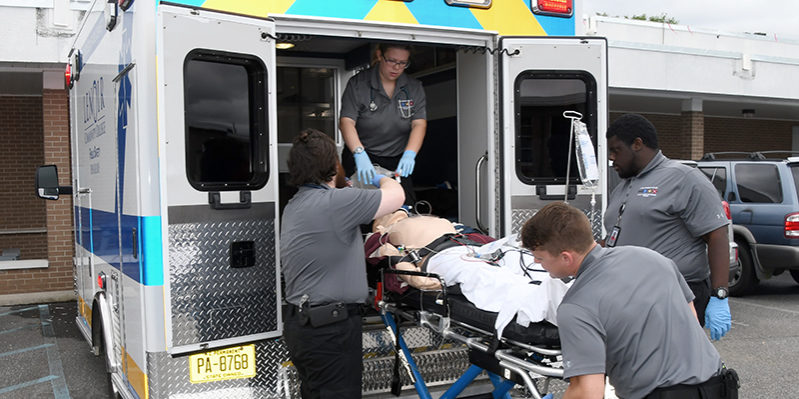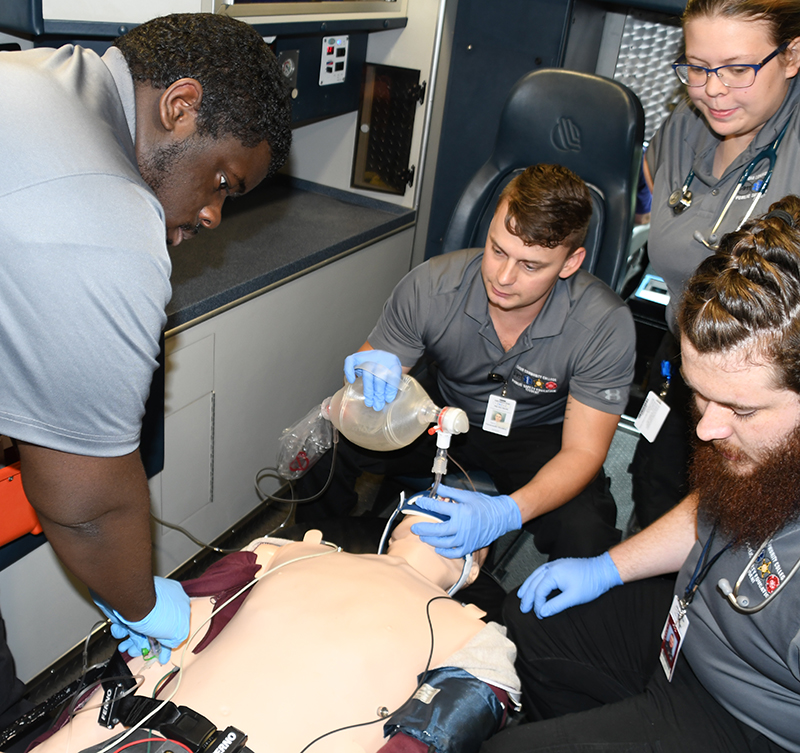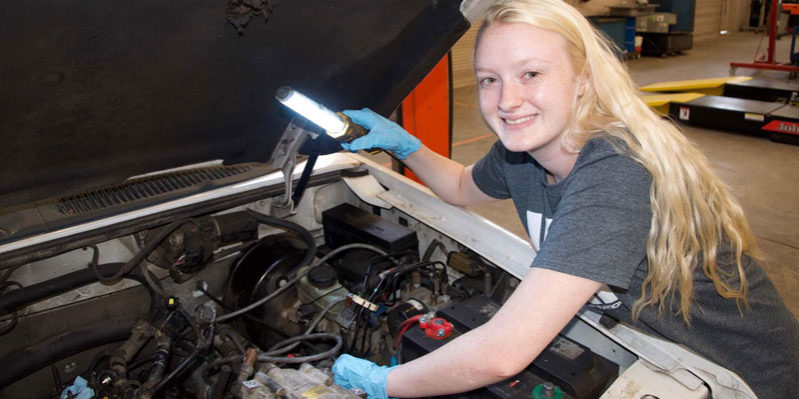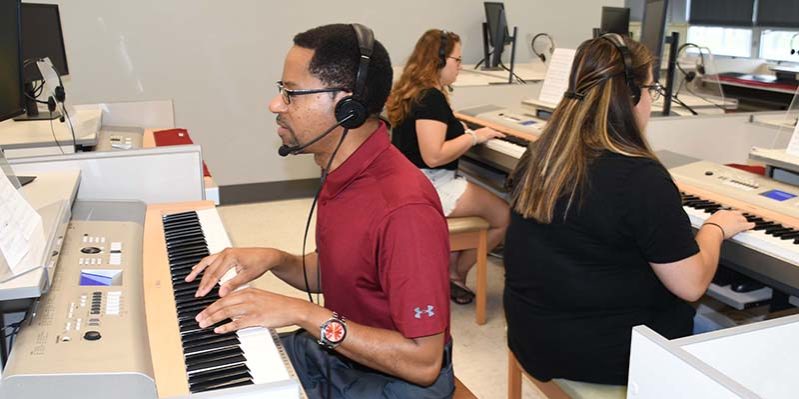
By Richy Huneycutt
Lenoir Community College is one in a system of many that offers Emergency Medical Science training, but it is one of the few community colleges to offer EMT Basic, EMT–Intermediate and Paramedic training in a hybrid format, an innovative and creative way to bring the classroom into a student’s environment.
LCC Associate Dean of Public Safety Justin Tilghman said it is wonderful to be able to offer the program in a way that allows students to achieve their educational and career goals. “For years EMS training, like any other area of training, has been offered only in the classroom setting,” he said. “However, Lenoir Community College has broken the mold and is setting the standard for the newest types of EMS training, preparing the way with innovative training methods to ensure student success and marketability.”
 Offering EMT training in a hybrid format is a perfect fit for reaching rural or remote areas. “The College has come a long way in regards to Public Safety training,” Tilghman said. “What started as a few classrooms and course offerings has exploded into a nationally recognized program, training lab, and several dedicated training areas.”
Offering EMT training in a hybrid format is a perfect fit for reaching rural or remote areas. “The College has come a long way in regards to Public Safety training,” Tilghman said. “What started as a few classrooms and course offerings has exploded into a nationally recognized program, training lab, and several dedicated training areas.”
What does this really mean for the student? Tilghman said that this allows students from all over the state and country to attend training sessions in Kinston. The hybrid format allows students to complete their lectures and some assignments in the convenience of their own home. Then, when the time comes for them to visit the College’s main campus, instructors are able to spend the majority of their time working with students in the skills lab. This allows students to spend their time physically training and honing their skills as EMTs.
“This really is a new concept,” Tilghman said. “The idea itself isn’t new, but applying it to EMS training is new. The idea of ‘flipping the classroom,’ or creating a hybrid class format, has been used in several other fields of study. We just thought it made sense to use it in EMS training as well. The greatest benefit is that it allows us to offer more classes in a more convenient time frame so students can achieve their educational and career goals without having to quit their current jobs to do it.”
LCC has also established a nationally recognized simulation lab. The lab has a fully equipped and operational indoor ambulance simulator with monitors and cameras for better assessment and review of procedures on ambulance transports. It also contains several smaller simulation labs that allow students to get more one-on-one hands-on experience. Each simulation lab is equipped with that latest in patient simulation technology. The EMS program has several hi-fidelity simulation manikins that are the closest thing available, other than real patients, in regards to training.
“The manikins can do everything a human can do just short of physically moving their arms,” Tilghman said. “They breathe, cry, sweat, shake, react to medication, and even have a real heartbeat! This all comes together to help us produce competent students who are well prepared when they complete the program.”
You don’t have to take the College’s word for it, though. “We interview students and employers after every class graduates and we are consistently finding that this training format is not only convenient but produces excellent, quality students,” he said. “We are also finding that this isn’t just a North Carolina thing either. We have trained students who are currently working as far away as California and even there, the employers are pleased with the quality of training here at LCC. Because of this format, LCC is truly becoming a leading name in quality EMS training, not just in NC, but across the country.”
EMT courses are offered throughout the year. “We have classes starting every month of the year,” Tilghman said. In general, LCC offers 10 Paramedic classes, six Advanced EMT classes, and 12 EMT classes every year.
Students must have a high school diploma or High School Equivalency and Adult High School diploma to register for EMT classes, and be 18 years or older to take the licensure exam. For Advanced EMT and Paramedic courses, students must take placement exams for math and English and have vaccinations records.
LCC is also a Certified Training Center (CTC) for the American Heart Association (AHA). “We offer classes in First Aid, CPR, Advanced Cardiac Life Support, and Pediatric Advanced Life Support,” Tilghman said. “We also offer CPR/ACLS/PALS Instructor courses for those interested in becoming AHA instructors.”
For more information, visit LCC EMT.
Emergency Medical Management Program
Degree: Associate of Applied Science
Credits Required: 67
This major is designed to provide students with a foundation of technical and professional knowledge needed for emergency management in local, state and federal government agencies as well as private industries, according to Dean of Public Safety and Emergency Management Justin Tilghman.
Students are involved in both management and technical aspects of law enforcement, fire protection, emergency medical services, and emergency planning. “If you enjoy fast-paced, ever-changing situations, this is a program you should consider,” Tilghman said. “You are directly involved in making a difference in your community during disasters and emergencies by helping develop plans that will affect your community for years to come.”
The program prepares graduates to serve with federal, state or local departments, and other private and public organizations. Course work includes classroom and laboratory exercises to introduce students to various aspects of emergency preparedness, protection, and enforcement.
“These professionals will be needed to help businesses and organizations continue to provide essential services during and after emergencies,” Tilghman said.
Students will gain knowledge and experience in developing emergency response plans, staffing Emergency Operation Centers, coordinating multi-agency and multi-jurisdictional emergency response, and more.
According to Career Coach (https://lenoircc.edu.emsicc.com):
- Employment is projected to grow 8 percent from 2016 to 2026, about as fast as the average for all occupations.
- Median hourly wages for Emergency Management personnel is $65,267. The importance of preparing and minimizing the risks from emergencies will help sustain demand and employment opportunities.
- Opportunities for jobs and job advancement will be best for those who have earned advanced certifications.
For more information, visit LCC EMS.


